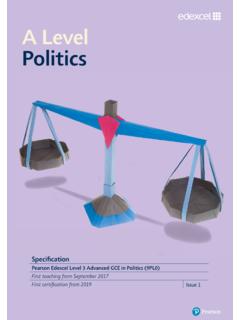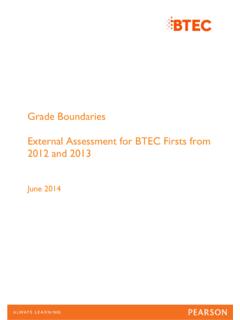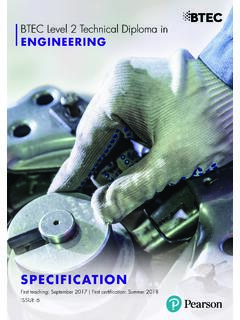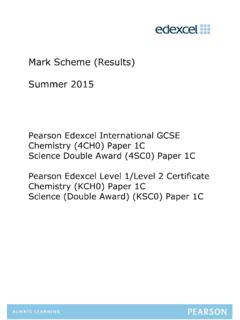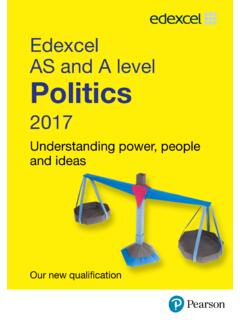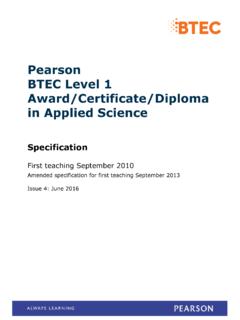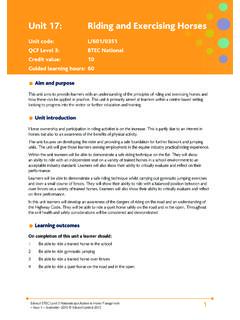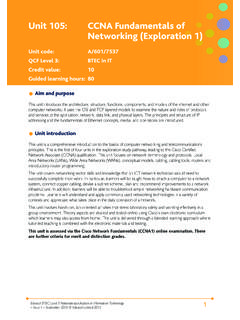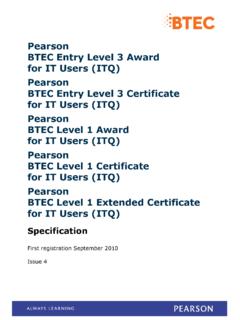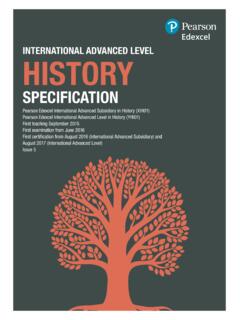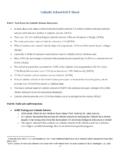Transcription of May–June 2022 Assessment Window 1RA0
1 Pearson Edexcel Level 1/Level 2 GCSE. May June 2022 Assessment Window Syllabus reference 1RA0. Religious Studies A.. Advance Information You are not permitted to take this notice into the examination. This document is valid if downloaded from the Pearson Qualifications website. Instructions Please ensure that you have read this notice before the examination. Information This notice covers all examined components. The format/structure of the assessments remains unchanged. This advance information details the focus of the content of the exams in 2022 assessments.
2 There are no restrictions on who can use this notice. This notice is meant to help students to focus their revision time. Students and teachers can discuss the advance information. This document has 21 pages. Continue *W73058A*. W73058A. 2022 Pearson Education Ltd. G:1/1/1. General advice In addition to covering the content outlined in the advance information, students and teachers should consider how to: manage their revision of parts of the specification that may be assessed in areas not covered by the advance information manage their revision of other parts of the specification that may provide knowledge which helps with understanding the areas being tested in 2022.
3 For specifications with synoptic assessments, topics not explicitly given in the advance information may appear, where students are asked to bring together knowledge, skills and understanding from across the specification. For specifications with optional papers/topics/content, students should only refer to the advance information for their intended option. (Bullet point black) For specifications with NEA, advance information does not cover any NEA components A link to the Joint Council for Qualifications guidance document on advance information can be found on the Joint Council for Qualifications website or here.
4 W73058A 2. Continue Advance Information Subject specific section For each paper, the information listed in the tables shows the major focus of the content of certain AO1 and AO2 questions. For the sections outlined in this notice, exam questions will sample content from the areas listed in this advance information. Note that the exam may include some or all of the content in the listed topics. Sections not outlined in this advance information will follow the normal examination rules. The information is presented in specification order and not in question order.
5 Students will be credited for using any relevant knowledge from any other topic areas when answering questions. In the questions assessing the sections outlined in this advance information, there is no expectation of knowledge beyond that identified in order to achieve full marks. W73058A 3. Continue Table of Contents 1RA0/1A ..5. 1RA0 1RA0 1RA0/2A ..10. 1RA0 1RA0 1RA0 1RA0/2E ..14. 1RA0/2F ..15. 1RA0/2G ..16. 1RA0/3A ..17. 1RA0 1RA0 1RA0/4A ..20. 1RA0 W73058A 4. Continue 1RA0/1A. Paper 1: Area of Study 1 Study of Religion Option 1A catholic Christianity Section 1: Beliefs and Teachings Content The Trinity: the nature and significance of the Trinity as expressed in the Nicene Creed; the nature and significance of the oneness of God; the nature and significance of each of the Persons individually: God as the Father, Son and Holy Spirit; how this is reflected in worship and belief in the life of a catholic today.
6 Creation: the nature and significance of the biblical account of Creation, including Genesis 1 3; and how it may be understood in divergent ways in Christianity, including reference to literal and metaphorical interpretations; the significance of the Creation account for Catholics in understanding the nature and characteristics of God, especially as Creator, benevolent, omnipotent and eternal. The Incarnation: Jesus as incarnate Son, the divine Word, including John 1, both fully God and fully human; the scriptural origins of this belief, including John 1:1 18 and its importance for Catholics today.
7 The events in the Paschal Mystery: catholic teachings about the life, death, resurrection and ascension of Jesus, including reference to Luke 24; the redemptive efficacy of these events and their significance for Catholics today. Section 3: Sources of Wisdom and Authority Content The Second Vatican Council: the nature, history and importance of the council;. the nature and significance of the four key documents for the Church and for catholic living: Dei Verbum, Lumen Gentium, Sacrosanctum Concilium and Gaudium et Spes. The meaning of the four marks of the Church: the nature of the Church as one, holy, catholic and apostolic including reference to the Nicene Creed and the First Council of Constantinople; how the marks may be understood in divergent ways within Christianity; why they are important for Catholics today.
8 Mary as a model of the Church: the significance of Mary as a model of the Church joined with Christ in the work of salvation, as a model of discipleship and as a model of faith and charity, including Luke 1:26 39 and Catechism of the catholic Church 963 975; the implications of this teaching for catholic life today. Sources of personal and ethical decision making: the example and teaching of Jesus as the authoritative source for moral teaching; Jesus as fulfilment of the Law, including Matthew 5:17 24; divergent understandings of the place and authority of natural law; virtue and the primacy of conscience; the divergent implications of these sources of authority for Christians today.
9 W73058A 5. Continue 1RA0/1B. PAPER 1: Area of Study 1 Study of Religion Option 1B Christianity Section 1: Beliefs and Teachings Content The creation of the universe and of humanity: the biblical account of creation and divergent ways in which it may be understood by Christians, including as literal and metaphorical; the role of the Word and Spirit in creation, including John 1:1 18 and Genesis 1 3; the importance of creation for Christians today. The Incarnation: the nature and importance of the person of Jesus Christ as the incarnate Son of God; the biblical basis of this teaching, including John 1:1 18.
10 And 1 Timothy 3: 16 and its significance for Christians today. * christian eschatology: divergent christian teachings about life after death, including the nature and significance of resurrection, judgement, heaven, and hell and purgatory, with reference to the 39 Articles of Religion and catholic teachings; how beliefs about life after death are shown in the Bible, including reference to 2 Corinthians 5:1 10 and divergent understandings as to why they are important for Christians today. The problem of evil/suffering and a loving and righteous God: the problems it raises for Christians about the nature of God, including reference to omnipotence and benevolence, including Psalm 103; how the problem may cause believers to question their faith or the existence of God; the nature and examples of natural suffering, moral suffering.
